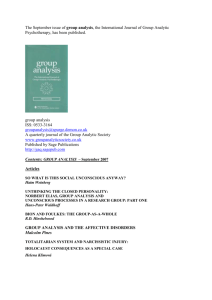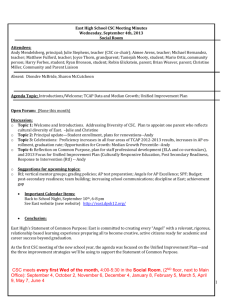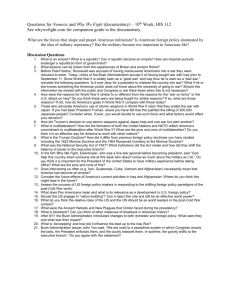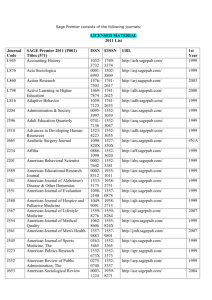war talk, the death of the social, and disappearing children
advertisement
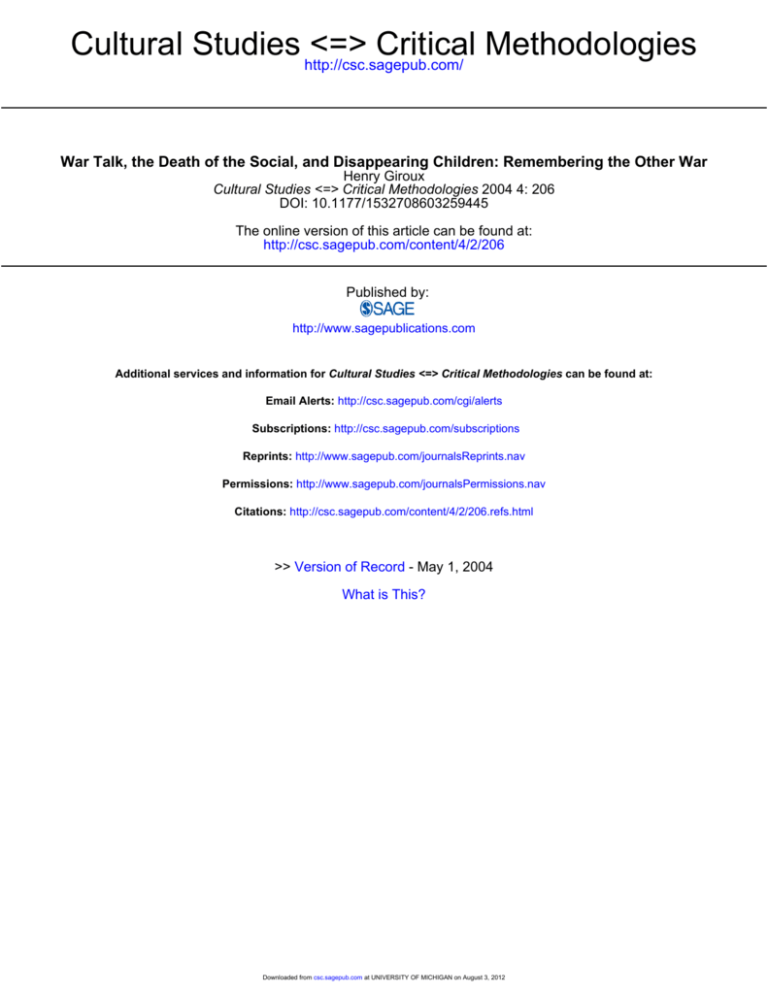
Cultural Studies http://csc.sagepub.com/ <=> Critical Methodologies War Talk, the Death of the Social, and Disappearing Children: Remembering the Other War Henry Giroux Cultural Studies <=> Critical Methodologies 2004 4: 206 DOI: 10.1177/1532708603259445 The online version of this article can be found at: http://csc.sagepub.com/content/4/2/206 Published by: http://www.sagepublications.com Additional services and information for Cultural Studies <=> Critical Methodologies can be found at: Email Alerts: http://csc.sagepub.com/cgi/alerts Subscriptions: http://csc.sagepub.com/subscriptions Reprints: http://www.sagepub.com/journalsReprints.nav Permissions: http://www.sagepub.com/journalsPermissions.nav Citations: http://csc.sagepub.com/content/4/2/206.refs.html >> Version of Record - May 1, 2004 What is This? Downloaded from csc.sagepub.com at UNIVERSITY OF MICHIGAN on August 3, 2012 10.1177/1532708603259445 Cultural Giroux • Studies War Talk↔ Critical Methodologies • May 2004 ARTICLE War Talk, the Death of the Social, and Disappearing Children: Remembering the Other War Henry Giroux McMaster University, Canada The war against terrorism is part and parcel of the war against democracy at home. This article argues that the war with Iraq will change the way the United States relates to the rest of the world as well as how it addresses the most pressing problems Americans face in their everyday lives. But the danger we face as a nation is not only related to the war in Iraq, it is also related to the silent war at home, especially because the Iraqi war and the war against terrorism are being financed from cuts in domestic funding on health care, children’s education, and other public services. It would be a tragic mistake for those of us on the left either to separate the war in Iraq from the many problems Americans face at home or fail to recognize how war is being waged by this government on multiple fronts. Keywords: war; terrorism; democracy; state repression I begin with two quotes that I believe signal the presence of another war somewhat removed from the Iraqi conflict, a war being waged on the domestic front that feeds off the general decay of democratic politics and reinforces what neoliberals cheerfully call the death of the social. The first quote comes from Debbie Riddle, a current Texas state representative. The second quote comes from Grover Norquist, the president of the Americans for Tax Reform and arguably Washington’s leading right-wing strategist. “Where did this idea come from that everybody deserves free education? Free medical care? Free whatever? It comes from Moscow. From Russia. It comes straight out of the pit of hell” (cited by Moyers, 2003a). “My goal is to cut government in half in twenty-five years, to get it down to the size where we can drown it in the bathtub” (cited in Dreyfuss, 2001). War, fear, and a particularly virulent contempt for social needs, as these quotes suggest, have now become the dominant motifs shaping the domestic and foreign policies of the United States. This is evident not only in the allembracing militarization of public life that is emerging under the combined power and control of neoliberal zealots, religious fanatics, and far right-wing conservatives but also in the destruction of a liberal democratic political order and a growing culture of surveillance, inequality, and cynicism.1 We are living Cultural Studies ↔ Critical Methodologies, Volume 4 Number 2, 2004 206-211 DOI: 10.1177/1532708603259445 © 2004 Sage Publications 206 Downloaded from csc.sagepub.com at UNIVERSITY OF MICHIGAN on August 3, 2012 Giroux • War Talk in dangerous times in which a new type of society is emerging unlike anything we have seen in the past—a society in which symbolic capital and political power reinforce each other through a public pedagogy produced by a concentrated media, which has become a cheerleading section for dominant elites and corporate ruling interests. This is a society increasingly marked by a poverty of critical public discourse, thus making it more difficult for young people and adults to appropriate a critical language outside of the market that would allow them to translate private problems into public concerns or to relate public issues to private considerations. This is also a social order that seems incapable of questioning itself, just as it wages war against the poor, youth, women, people of color, and the elderly. The recent war with Iraq will change the way the United States relates to the rest of the world as well as how it addresses the most pressing problems Americans face in their everyday lives. But the danger we face as a nation is not only related to the war in Iraq, it is also related to the silent war at home, especially because the Iraqi war and the war against terrorism are being financed from cuts in domestic funding on health care, children’s education, and other public services. It would be a tragic mistake for those of us on the left either to separate the war in Iraq from the many problems Americans face at home or fail to recognize how war is being waged by this government on multiple fronts. The war against terrorism is part and parcel of the war against democracy at home. Slavoj Zizek (2003) claims that the “true target of the ‘war on terror’ is American society itself—the disciplining of its emancipatory excesses” (p. 28). George Steinmetz (2003) argues that the current state of emergency represents a new shift in the mode of political power and regulation. He states that The refocusing of political power on the level of the American national state has been most evident in the are of U.S. Geopolitical strategy (unilateralism and preemptive military strikes), but much of the new regulatory activity has focused on the state apparatus itself and the “domestic” level of politics, with the creation of a huge new government agency (the department of Homeland Security), transformations of the legal system (e.g., secret trials and arrests, indefinite detentions), and intensified domestic surveillance: first with the 2001 USA Patriot Act, which dramatically relaxed restrictions on search and seizure; then with the [now defunct] Total Information Awareness program, which collects and analyzes vast amounts of data on private communications and commercial transactions; and most recently with the proposed domestic Security Enhancement Act of 2003. (p. 329) Both are partly right. The Bush “permanent war doctrine” is not just aimed at alleged terrorists or the excesses of democracy but also against disposable populations in the homeland, whether they be young Black men who inhabit our nations jails or those unemployed workers who have been abandoned by the flight of capital as well as all levels of government. The financing of the war in Iraq is buttressed by what Vice President Dick Cheney calls the concept of “never ending war.” This is a Downloaded from csc.sagepub.com at UNIVERSITY OF MICHIGAN on August 3, 2012 207 208 Cultural Studies ↔ Critical Methodologies • May 2004 concept that declares permanent war as a continuous state of emergency and brings into play a fundamentally new mode of politics. In a recent commencement speech at the United States Military Academy, Cheney provided a succinct outline of the permanent war concept: The battle of Iraq was a major victory in the war on terror, but the war itself is far from over. We cannot allow ourselves to grow complacent. We cannot forget that the terrorists remain determined to kill as many Americans as possible, both abroad and here at home, and they are still seeking weapons of mass destruction to use against us. With such an enemy, no peace treaty is possible; no policy of containment or deterrence will prove effective. The only way to deal with this threat is to destroy it, completely and utterly. (Dillon, 2003, p. 28) The apocalyptic tone of his comments do more than cover up the fictive relationship between Iraq and 9/11, it also serves to legitimate a bloated and obscene military budget as well as economic and tax policies that are financially bankrupting the states, destroying public education, and plundering public services. The U.S. government plans to spend up to $400 billion to finance the Iraqi war and the ongoing occupation, whereas it allocates only $16 billion to welfare programs that cannot possibly address the needs of over 33 million people who live below the poverty line, many of them children, or the 43.8 million without health insurance, or the millions now unemployed because of diminished public services and state resources. Although $350 billion is allocated for tax cuts for the rich, state governments are cutting a total of $75 billion in health, welfare benefits, and education. The sheer inhumanity this government displays toward the working poor and children living below and slightly above poverty level can be seen in the decision by Republicans in Congress to eliminate from the recent tax bill the $400 child credit for families with incomes between $10,000 and $26,000. The money saved by this cut will be used to pay for the cut on dividend taxes. The result, as Bill Moyers (2003a) observes, is “eleven million children punished for being poor, even as the rich are rewarded for being rich.” These multiple attacks on the poor and much-needed public services need to be connected to an expanded political and social vision that refuses the cynicism and sense of powerlessness that accompanies the destruction of social goods, the corporatization of the media, the dismantling of workers’ rights, and the incorporation of intellectuals. Against this totalitarian onslaught, progressives need a language of critique and possibility, one that connects diverse struggles, uses theory as a resource, and defines politics as not merely critical but also as an intervention into public life. As Noam Chomsky (2003) has argued with great brilliance and passion, we need a language that relates the discourse of war to an attack on democracy at home and abroad, and we need to use that language in a way that captures the needs, desires, histories, and experiences that shape people’s daily lives. Similarly, as democratic institutions are downsized and public goods are offered up for corporate plunder, those of us who take seriously the related issues of equality, human rights, jus- Downloaded from csc.sagepub.com at UNIVERSITY OF MICHIGAN on August 3, 2012 Giroux • War Talk tice, and freedom face the crucial challenge of formulating a notion of the political suitable for addressing the urgent problems now facing the 21st century—a politics that, as Zygmunt Bauman (2002) argues, “never stops criticizing the level of justice already achieved and seeking more justice and better justice” (p. 54). As Ulrich Beck (2002, p. 1) has argued, the language of war has taken a distinctly different turn in the new millennium. War no longer needs to be ratified by Congress as it is now waged by various government agencies that escape the need for official approval. War has become a permanent condition adopted by a nation-state that is largely defined by its repressive functions in response to its powerlessness to regulate corporate power, provide social investments for the populace, and guarantee a measure of social freedom. The concept of war occupies a strange place in the current lexicon of foreign and domestic policy. It no longer simply refers to a war waged against a sovereign state such as Iraq, nor is it merely a moral referent for engaging in acts of national self-defense. The concept of war has been both expanded and inverted. It has been expanded in that it has become one of the most powerful concepts for understanding and structuring political culture, public space, and everyday life. Wars are now waged against crime, labor unions, drugs, terrorism, and a host of alleged public disorders. Wars are not declared against foreign enemies but against alleged domestic threats. The concept of war has also been inverted in that has been removed from any concept of social justice—a relationship that emerged under President Lyndon Johnson and was exemplified in the war on poverty. War is now defined almost exclusively as a punitive and militaristic process. This can be seen in the ways in which social policies are now criminalized so that the war on poverty is now a war against the poor, the war on drugs is now a war waged largely against youth of color, and the war against terrorism is now largely a war against immigrants, domestic freedoms, and dissent itself. In the Bush, Perle, Rumsfeld, and Ashcroft view of terrorism, war is individualized, as every citizen becomes a potential terrorist who has to prove that he or she is not dangerous. Under the rubric of emergency time, which feeds off government-induced media panics, war provides the moral imperative to collapse the “boundaries between innocent and guilty, between suspects and non-suspects” (Beck, 2002, p. 3). War provides the primary rhetorical tool for articulating a notion of the social as a community organized around shared fears rather than shared responsibilities and civic courage. War is now transformed into a slick Hollywood spectacle designed to both glamorize a notion of hypermasculinity fashioned in the conservative oil fields of Texas and fill public space with celebrations of ritualized militaristic posturing touting the virtues of either becoming part of “an Army of one” or indulging in commodified patriotism by purchasing a new Hummer. War as spectacle easily combines with the culture of fear to divert public attention away from domestic problems, define patriotism as consensus, and further the growth of a police state. The latter takes on dangerous overtones not only with the passage of the Patriot Act and the suspension of civil lib- Downloaded from csc.sagepub.com at UNIVERSITY OF MICHIGAN on August 3, 2012 209 210 Cultural Studies ↔ Critical Methodologies • May 2004 erties but also with the elimination of those laws that traditionally separated the military from domestic law enforcement and offered individuals a vestige of civil liberties and freedoms. The political implications of the expanded and inverted use of war as a metaphor can also be seen in the war against “big government,” which is really a war against the welfare state and the social contract itself—this is a war against the notion that everyone should have access to decent education, health care, employment, and other public services. One of the most serious issues to be addressed in the debate about Bush’s concept of permanent war is the effect it is having on one of our most vulnerable populations, children, and the political opportunity this issue holds for articulating a language of both opposition and possibility. Wars are almost always legitimated in order to make the world safe for “our children’s future,” but the rhetoric belies how their future is often denied by the acts of aggression put into place by a range of ideological state apparatuses that operate on a war footing. This would include the horrible effects of the militarization of schools, the use of the criminal justice system to redefine social issues such as poverty and homelessness as violations of the social order, and the subsequent rise of a prison-industrial complex as a way to contain disposable populations such as youth of color who are poor and marginalized. Under the rubric of war, security, and antiterrorism, children are “disappeared” from the most basic social spheres that provide the conditions for a sense of agency and possibility as they are rhetorically excised from any discourse about the future. The “disappearing” of children is made more concrete and reprehensible with the recent revelation of the three children between the ages of 13 and 15 who were being held without legal representation as enemy combatants in possibly inhumane conditions at the military’s infamous Camp Delta at Guantanamo Bay, Cuba. One wonders how the Bush administration reconciles its construction of a U.S. gulag for children with their fervent support of family values and the ideology of compassionate conservativism. The Bush administration’s aggressive attempts to reduce the essence of democracy to profit making, shred the social contract, elevate property rights over human rights, make public schools dysfunctional, and promote tax cuts that will limit the growth of social programs and public investments fail completely when applied to the vast majority of citizens, but especially fail when applied to children. And yet, children provide one of the most important referents for exposing and combating such policies. Making visible the suffering and oppression of children cannot help but challenge the key assumptions of “permanent war” policies designed to destroy public institutions and prevent government from providing important services that ameliorate ignorance, poverty, racism, inequality, and disease. Children offer a crucial rationale for engaging in a critical discussion about the long-term consequences of current policies. Any debate about war, regime change, and military intervention is both unethical and politically irresponsible if it does not recognize how such policies affect children. The focus on children may be one place to begin to Downloaded from csc.sagepub.com at UNIVERSITY OF MICHIGAN on August 3, 2012 Giroux • War Talk develop a unifying rallying point of struggle and resistance in order to make clear to a broader public that Bush’s permanent war strategy and discourse of moral absolutes promotes democracy neither abroad nor at home, and its alleged value can best be understood in the hard currency of human suffering that children all over the globe are increasingly forced to pay. Note 1. Arianna Huffington (2003) recently argued that we are being governed by “a gang of out-and-out fanatics.” George Soros (2004) has recently argued that the United States government is “in the hands of a group of extremists whose strong sense of mission is matched only by their false sense of certitude”(p. viii). References Bauman, Z. (2002). Society under siege. Malden, MA: Blackwell. Beck, U. (2002). The silence of words and political dynamics in the world risk society. Logos, 1(4), 1-18. Chomsky, N. (2003). Hegemony or survival: America’s quest for global dominance. New York: Metropolitan Books. Dillon, S. (2003, June 1). Reflections on war, peace, and how to live vitally and act globally. The New York Times, p. 28. Dreyfuss, R. (2001, May 14). Grover Norquist: “Field marshal” of the Bush plan. The Nation. Retrieved from http://www.thenation.com/doc.mhtml?i=20010514&s= dreyfuss. Huffington, A. (2003, May 21). A White House fluent in language of fanatics. Common Dreams News Center. Retrieved from www.commondreams.org/views03/0521-on.htm Moyers, B. (2003a, May 30). Deep in a black hole of red ink. Common Dreams News Center. Retrieved from www.commondreams.org/views03/0530-11.htm. Moyers, B. (Executive Producer). (2003b, May 9). NOW [Television series]. Washington, DC: Public Broadcasting Services. Soros, G. (2004). The bubble of American supremacy. New York: Public Affairs Group. Steinmetz, G. (2003). The state of emergency and the revival of American imperialism: Toward an authoritarian post-Fordism. Public Culture, 13(2), 323-325. Zizek, S. (2003, May 5). Today Iraq, tomorrow . . . democracy? In These Times, pp. 28-30. Henry Giroux is the Global TV Network Chaired Professor in Communication at McMaster University in Canada. His most recent books are The Abandoned Generation (2004), Take Back Higher Education (coauthored with Susan Searls Giroux, 2004), and The Terror of Neoliberalism (2004). Downloaded from csc.sagepub.com at UNIVERSITY OF MICHIGAN on August 3, 2012 211
